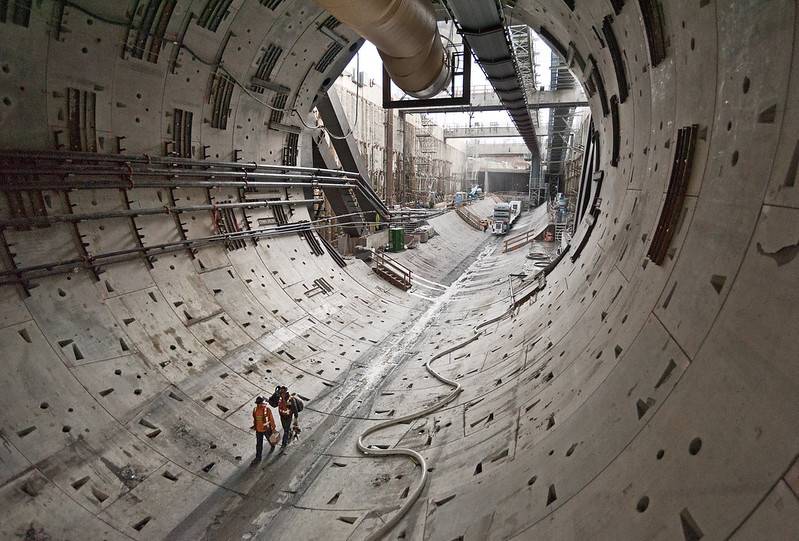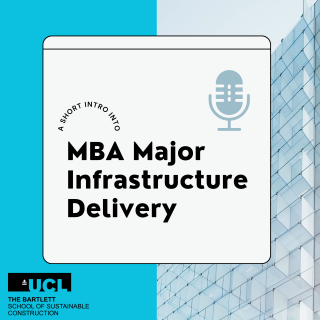This course is designed to equip mid-career professionals with innovative management and leadership practices to successfully deliver major infrastructure projects.

Apply now
Scholarships
Two scholarships are available for female applicants with home/UK fee status to pursue the MBA: The Prescot Scholarship for Women in Leadership in Infrastructure and Construction, and The BSSC Women in Construction MBA Scholarship. The scholarships will be awarded based on academic merit and provide support for full fees as well as contribute to living costs.
Find out more about the scholarships and apply here.
On this page
- Overview
- Course content
- Structure and assessment
- Study modes, entry requirements and fees and funding
- Programme staff
- External advisory board
- Careers
- Register your interest
Overview
Major infrastructure projects are high profile and critical to the economy, where leadership is essential to navigate several aspects of project delivery. However, leaders are in short supply and there is a necessity to enhance the understanding of the dimensions and interfaces between technical, organisational, and political topics. Considering the complex nature of such projects, this programme provides a platform for mid-career professionals to strengthen and develop further their values-led leadership, which will be the foundation of their strategic decisions and shape the dynamics of future cities and societies.
The Major Infrastructure Delivery MBA engages in a global challenge of providing capabilities to attend several immutable factors, namely: increasing urbanisation, growing population, and fast development of emerging economies. The scope of this new Major Infrastructure Delivery MBA is to provide experienced project management professionals with the necessary training to assume increasingly higher management positions in organisations delivering major infrastructure projects.
The Major Infrastructure Delivery MBA has several aims:
- Develop an advanced understanding of the key managerial components of major infrastructure organisations, and the strategic importance of infrastructure in the next decades across the world.
- Analyse the impact of innovative management and leadership practices and design strategies to deal with the poor performance of complex organisations that deliver major infrastructure projects.
- Incorporate and apply the underpinning personal and collective values of complex organisations, which will provide the leadership foundation for the strategic decisions.
- Critically analyse the latest theoretical and practical developments in the fields of management, organisation studies, and social science with regards to the management of complex infrastructure organisations.
- Evaluate the multi-level nature of major projects and lead the proposition of managerial solutions to navigate the interfaces between the external environment, the infrastructure organisation, and the multiple projects being coordinated.
- Develop the intellectual skills required for interpreting and reacting to changes at different levels of those political projects, navigating the myriad of stakeholders and contractual relationships.
The course will be based at the brand-new UCL East campus.
Course content
The Major Infrastructure Delivery MBA follows the management and organisation studies literature to challenge and advance the conventional thinking of project management practices in major infrastructure projects. The MBA builds upon the general management literature in light of the size and longevity of the corporate entities created to deliver those major endeavours, treating major projects as enterprises and advancing the traditional operational view of project management through an organisational theory perspective. It focuses on the inter-organisational challenges of infrastructure projects that are delivered by a myriad of companies, particularly emphasising the challenges of integrating the corporate and project levels, which are both dynamic and affected by a number of dimensions (internal and external) throughout the long and highly scrutinised project life-cycle.
The students of the Major Infrastructure Delivery MBA must take all eight compulsory modules and the dissertation.
The course is based around the following core modules:
- Analysing the anatomy of major projects – the context in which major infrastructure projects are proposed and developed, revealing different market structures and models to bridge the global infrastructure gap.
- Managing economic and financial risks – an understanding of the connections throughout the project life-cycle, from demand forecast, through business cases, until the implications to the financial performance of the organisations delivering major infrastructure projects.
- Structuring governance and assurance – explores the relationship between risk management, governance, and assurance processes across organisational and institutional boundaries.
- Designing client organisations and corporate strategies – explores the functions within the boundaries of the client organisation, and prepares the argument for the necessity of thinking about the inter-organisational perspective, considering the interfaces with the supply chain.
- Procuring and integrating the supply chain – principles of supply chain management, procurement and operations building upon production logics of vertical integration and outsourcing, which inform the decomposability of the asset into internal and external parts.
- Building, developing and leading teams – leadership approaches to address the different culture and values at organisational and individual levels. It introduces the power dynamics of organisations and the role of leaders in shaping the strategy of the intra- and inter-organisational forms.
- Controlling information and systems – explores the challenges of information flows and the extraction of actionable business intelligence to manage human resources and organisational functions.
- Managing stakeholders and creating value – the principles of stakeholder management, theoretically framing the dynamics between internal and external players in complex and uncertain organisations. It presents strategies for the process of creation and co-creation of value to address the requirements of different stakeholders.
The programme ends with a dissertation. It is an academically rigorous piece of research and students can choose any topic they want as long as it is relevant to Major Infrastructure Delivery and can be supervised by a staff member from the Bartlett School of Sustainable Construction. The dissertation works as a management consultancy project, building upon the latest academic thinking to provide a piece of management advice to an organisation (e.g. public, private, non-profit).The dissertation demonstrates learning in problem formulation and the application of research methods to the investigation of specific research questions. Students are encouraged to formulate their own research proposal drawing upon theoretical or practical problems. Please visit the UCL Graduate Prospectus for more information.
Structure and assessment
The course structure is focused on learning through a mix of lectures, seminars, workshops, and analyses of case studies. All core modules are delivered through lectures by faculty and guest lecturers from industry. The guest lecturers come from the industry or policy field to reflect the multi-level nature of stakeholders and professions involved in major infrastructure projects.
Teaching is designed to support a mix of theoretical knowledge, practical skills and experiential learning. The programme combines scenario-based learning from management studies, as pioneered through the Harvard case teaching method and problem-based learning approach, popular in medical and engineering disciplines.
The programme is delivered through a blended diet of methods reflecting the holistic thinking needed to understand and manage several disciplinary silos during the delivery of major infrastructure projects.
Digital learning platforms are used throughout the course for learning and assessment.
The principal modes of assessment of these skills are analytical essays, coursework, examination and the MBA dissertation undertaken as a piece of independent research.
For more information, please visit the UCL Graduate Prospectus.
Study modes, entry requirements and fees and funding
Duration: The course is part-time over two years. The cohort is up to 35 students and formed by a global audience of executives.
Teaching consists of eight modules and a dissertation, which works as a management consultancy project. The MBA is designed to capture senior executives working full-time in the delivery of major projects. The MBA students are required to be in London for in person modules in five periods of 09 days over the two years. Each period of nine days will happen from Saturday morning to the end of Sunday of the subsequent week.
Year 1: October (Modules 1 and 2), February (Modules 3 and 4), May (Modules 5 and 6).
Year 2: October (Modules 7 and 8), May (Dissertation).
For more information, please refer to the UCL Graduate Prospectus.
Entry requirements: Read the full entry requirements for this course on the UCL Graduate Prospectus.
Fees and funding
Fees: Tuition fee information can be found on the UCL Graduate Prospectus.
Funding: For a comprehensive list of the funding opportunities available at UCL, including funding relevant to your nationality, please visit the Scholarships and Funding section of the UCL website.
MBA student testimonials
“The quality of teaching has been exceptional, and the MBA is supported by a cast of high-profile industry experts who provide lectures and act as mentors to the MBA students. The mentoring program is a real bonus for the MBA.
Caroline Warrington, class of 2023-25, Head of Command, Control & Signalling (CCS) and Testing at HS2
Programme staff
The MBA core teaching staff are members of the Bartlett School of Sustainable Construction exploring management and leadership aspects of delivering major infrastructure projects. These staff are supplemented by industry experts. This ensures the connection of teaching with both current research and best industry practice.
Programme Director
Dr Juliano Denicol
juliano.denicol@ucl.ac.uk
Deputy Programme Director
Dr Katharina Burger
katharina.burger@ucl.ac.uk
Teaching and learning administrator
Suzanne Hogan
suzanne.hogan@ucl.ac.uk
External advisory board
The Major Infrastructure Delivery MBA is supported by and developed in consultation with an external advisory group of leading individuals, passionate about pushing Major Infrastructure Projects forward. Their involvement ensures that the programme is rooted in real-world aims, actions, and successes.
Peter Hansford – Former Chief Construction Adviser, UK Government. Chair, UCL Major Infrastructure Delivery External Advisory Board
Andy Mitchell – Chief Executive Officer, Thames Tideway Tunnel
Drew Jeter – Chief Executive Program Management Global Business line, AECOM
John Pelton – Programme Director, Costain. Former Programme Partner Director for the East West Rail programme
Julia Prescot – Co-Founder and Chief Strategy Officer, Meridiam Infrastructure. Commissioner, UK National Infrastructure Commission
Mark Thurston – Former Chief Executive Officer, High Speed Two
Martin Buck – Senior Adviser Agilia Infrastructure Partners. Expert Adviser Governance, Crossrail International. Former Commercial Director, Crossrail
Dr Michèle Dix – Non-Executive Director Crossrail International; former Managing Director Crossrail 2, Transport for London
Nick Smallwood – Chief Executive Officer, Infrastructure and Projects Authority
Pau Lian Staal-Ong – Director of NETLIPSE, NETwork for the dissemination of knowledge on the management and organisation of Large Infrastructure ProjectS in Europe
Phil Wilbraham – Former Programme Director, Heathrow Expansion
Sue Kershaw – Senior Vice President Program Executive, AECOM
Careers
The course is purposefully open-ended in the sense that it allows the development of a number of transferable skills, qualities and behaviours to deliver major infrastructure projects. Some modules focus on leadership, teamwork, interpersonal and digital skills, which are essential to future career effectiveness.
After completing this course, you are expected to go on to work in many related areas across several infrastructure sectors: government agencies sponsoring major infrastructure projects, public and private sector infrastructure client organisations, management consultancies, engineering consultancies, contractors, and enterprises with significant portfolios of major infrastructure projects.
Additionally, through events aimed at industry and alumni organised by the Bartlett School of Sustainable Construction, you will have the opportunity to meet like-minded professionals in the field. Each year the School also hosts a series of careers events for students - including CV and interview skills sessions, a dedicated Careers Fair, site visits and an alumni panel event. UCL Careers also offers a regular programme of careers fairs and practical sessions on careers advice.
- Learn more about careers support available at the School.
- Find out more about our School alumni and their career paths.
More information
- For key information, including how to apply, visit the UCL Graduate Prospectus.
 Close
Close




